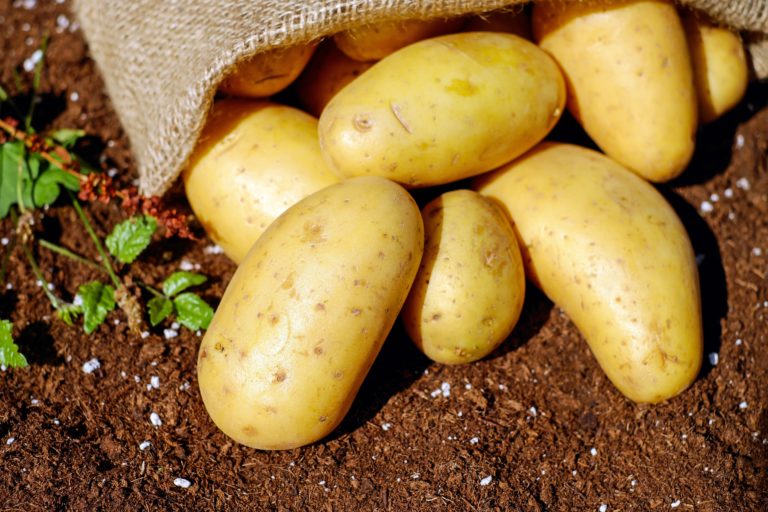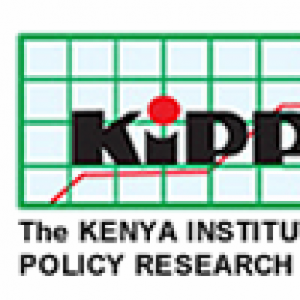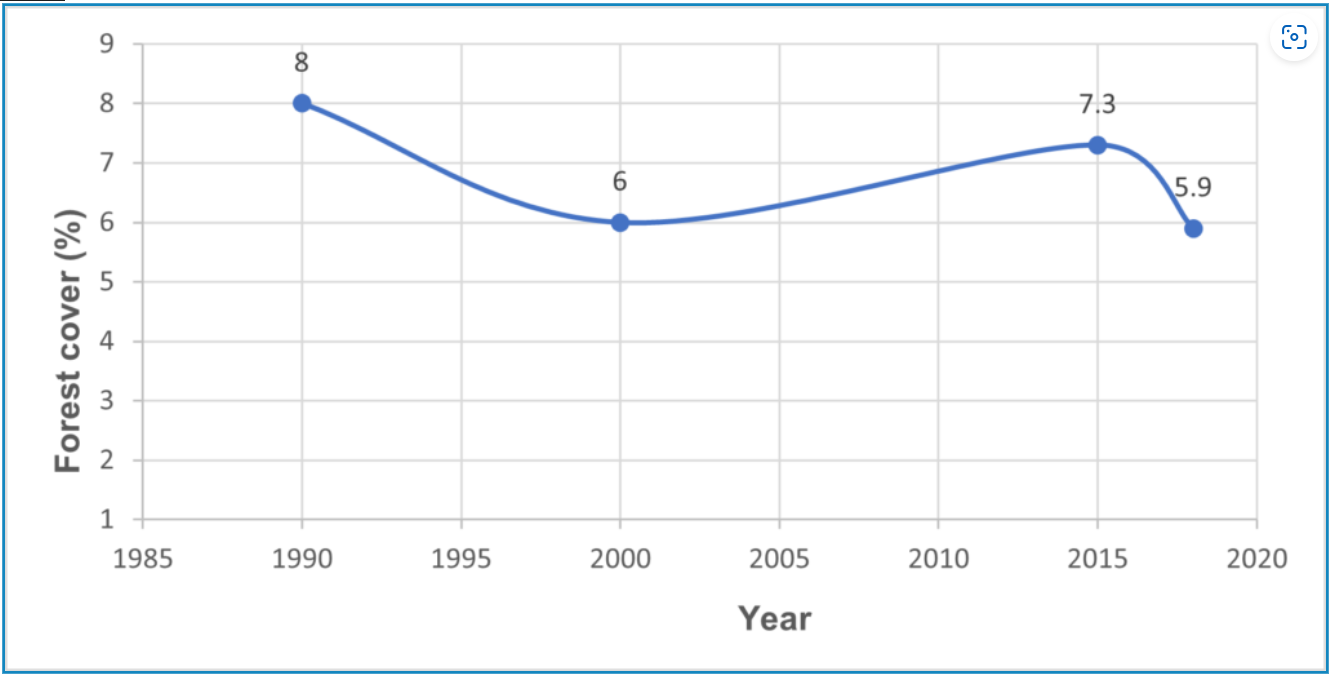Potato is the second staple in Kenya after maize. The potato industry employs 2 million Kenyans and contributes US$ 500 million to the country’s economy annually. Besides the restaurant business, the growing urban population in Kenya presents a wider market for the crop producers. To meet the growing demand, the country aims to increase the local production of the processing potato varieties. The national production is at 1.5 million tons, against 40% of the Government’s target of 2.5 million tons per year.
Policy issues
Potato yield plummeted to 8.6t/ha in 2018 from 21.2 t/ha in 2008. Presently, the yield has stagnated at 7 t/ha against the potential of 40 t/ha, far behind Africa’s top performers, South Africa and Egypt, whose yields per hectare are 35 tons and 25 tons, respectively. Although low yields cannot be solely blamed on the inadequate supply of certified or clean seed, empirical studies and reports suggest that endemic pests and diseases in the potato industry, such as nematodes, late blight and bacterial wilt are seed-borne.
The uptake of the certified seeds has remained low among small scale potato farmers. Only 2% of the 800,000 smallholder farmers in Kenya use certified seeds. About 95% use farmer-saved seeds, and 4% use clean seeds. This is despite bilateral agreements between the Government of Kenya and the French, Dutch, and British governments to avail modern, high-yielding seed varieties in Kenya.
The price of certified seeds is thrice the price of farmer-saved seed, accounting for almost 60% of the total variable production costs incurred by smallholder farmers. Even when the supply of certified seeds is adequate, the high prices make them inaccessible to smallholder farmers. Furthermore, with the prevailing farm-gate potato prices, some of the smallholder farmers who can afford formal seeds become risk averse from small profit margins earned by cultivating only certified seed. The certified seed yield would need to be 18t/ha to gain similar profits as with own-saved seeds whose yield is 8 t/ha.
The seed companies are concentrated in major towns, limiting farmers’ access to seed knowledge, training, and extension services. Across the country, there are only 30 registered seed potato producers. The seed companies are in Nairobi, Kiambu, Nakuru, Meru, Kitale, Nyandarua, and Taita Taveta. While the distribution of seed companies has improved with devolution, there is need to further decentralize seed companies to the sub-county levels where farmers can easily access them.
Certifying only the registered varieties bars the exchange of non-registered but farmer preferred variations. This will serve a small market margin of 2%, locking out most smallholder farmers who dominate 98% of the informal seed system. In a bid to align with the International Union for the Protection of New Varieties of Plants (UPOV) requirements, Kenya amended her Seed Varieties Act in 2012 that forbade farmers from trading in farm-saved seeds obtained from the protected varieties.
Interventions to enhance productivity
To bolster potato production and yield through productivity rather than expanding the area under cultivation, the government could strengthen its capacity by encouraging local investments in early generation seed technologies through public-private partnerships (PPP). Early generation seed technologies and partnerships are key resources
stakeholders can leverage on to increase the availability of certified potato seeds and close the production and supply gaps for higher yields.
To increase the uptake of certified seeds, the government may have to consider reviewing the 2010 National Seed Policy to formalize the predominantly informal potato seed system in Kenya. Past and current studies fault the policy for failing to embrace the concept of clean seeds by recognizing it as a tradable seed by law to exploit the potential of clean seeds to increase yields and reduce diseases. The conundrum to only promote certified potato seeds where informality dominates the seed market will reverberate in the foreseeable future if the law is not cognizant of the dual formal and smallholder production systems. Reviewing the policy will also attract more youth to the potato supply chain. Most young people shy away from semi-subsistence farming, and still have limited capacity to invest in commercial agriculture of their choices. Through training and policy, the Kenya Plant Health Inspectorate Service (KEPHIS) could recruit more youths as Registered Seed Merchants. Supporting locally produced clean seeds will ensure improved seed variety, food and nutritional security, and create employment, empowering smallholder potato farmers to live dignified lives.
In efforts to reduce the prices of certified potato seeds, the National Government launched a programme to license small-scale seed merchants and growers to produce certified potato seeds. Licensing farmer groups increases the number of producers of certified seeds, encouraging competition in the seed market to deliver more affordable, wide variety and high-quality seeds. Increasing the availability of certified potato seeds is thus a good step towards closing the production and supply gaps, addressing the challenges in accessing, and enhancing using uptake of the certified seeds.
Developing and implementing a more inclusive regulatory framework that incorporates more local seed producers will put Kenya on the path to accessing and embracing improved varieties, which will improve Kenya’s competitiveness in the continent. There are also plans between the Ministry of Agriculture, Livestock, Fisheries, and Co- operatives and the National Potato Council of Kenya to have potato farmers participate in the E-voucher system, which subsidizes the cost of certified potato seeds. The government needs to fast-track the E-voucher system among potato farmers.
Key among the reform actions that the National Government has undertaken to improve access of farmer preferred seed variations is to tailor-make the policy and regulatory framework to recognize better quality, affordable seeds developed from new rapid multiplication and improved conventional technologies to increase smallholder seed access. Developing a more inclusive regulatory framework will make farmer preferred seed varieties more available. An inclusive framework will also decentralize seed companies to the subnational levels, which provides a medium to build relationships, trust, and understanding between potato farmers and other actors in the potato chain.
Partnerships between research centres, non-profit organizations, and County and National governments will enhance collaboration among actors in the potato chain at the local level, promoting exchange of ideas, practices, skills and experiences among the rural, smallholder farmers. Such exchanges at the local level are necessary to spur growth in the sector. Farmers also benefit from training related to quality seed maintenance and disease management. The interactions not only help potato actors in the field to gather farmers’ input, including the problems farmers encounter and possible solutions, but improve their understanding of the challenges farmers encounter, empowering seed experts to break down information into simple forms for farm use. This approach to programmes supports farmers’ agency. It approaches farmers as partners and producers of knowledge, not mere consumers, breaking a constant barrier to using certified seeds among rural, smallholder farmers across Africa.
Authors: Judy Kaaria, Young Professional, Productive Sector Department
Dan Basil, Young Professional, Social Sector Department






